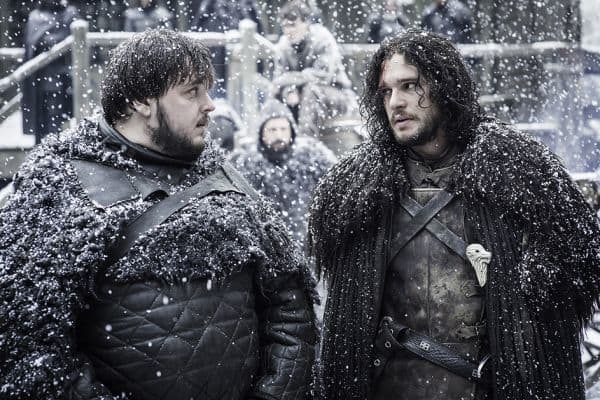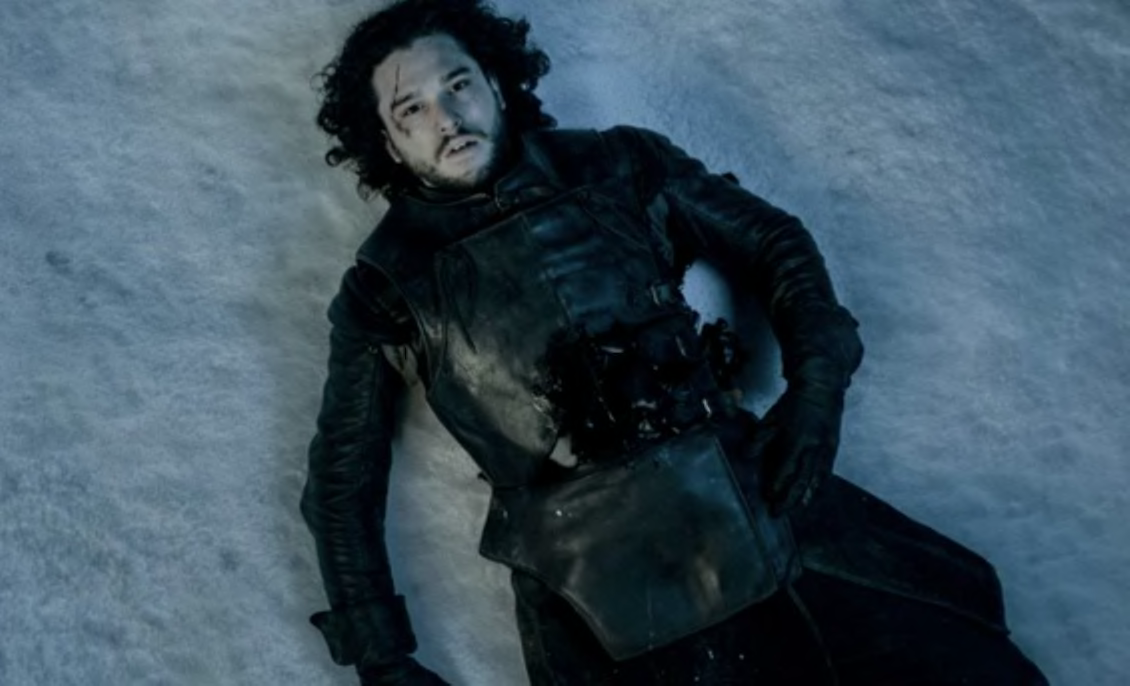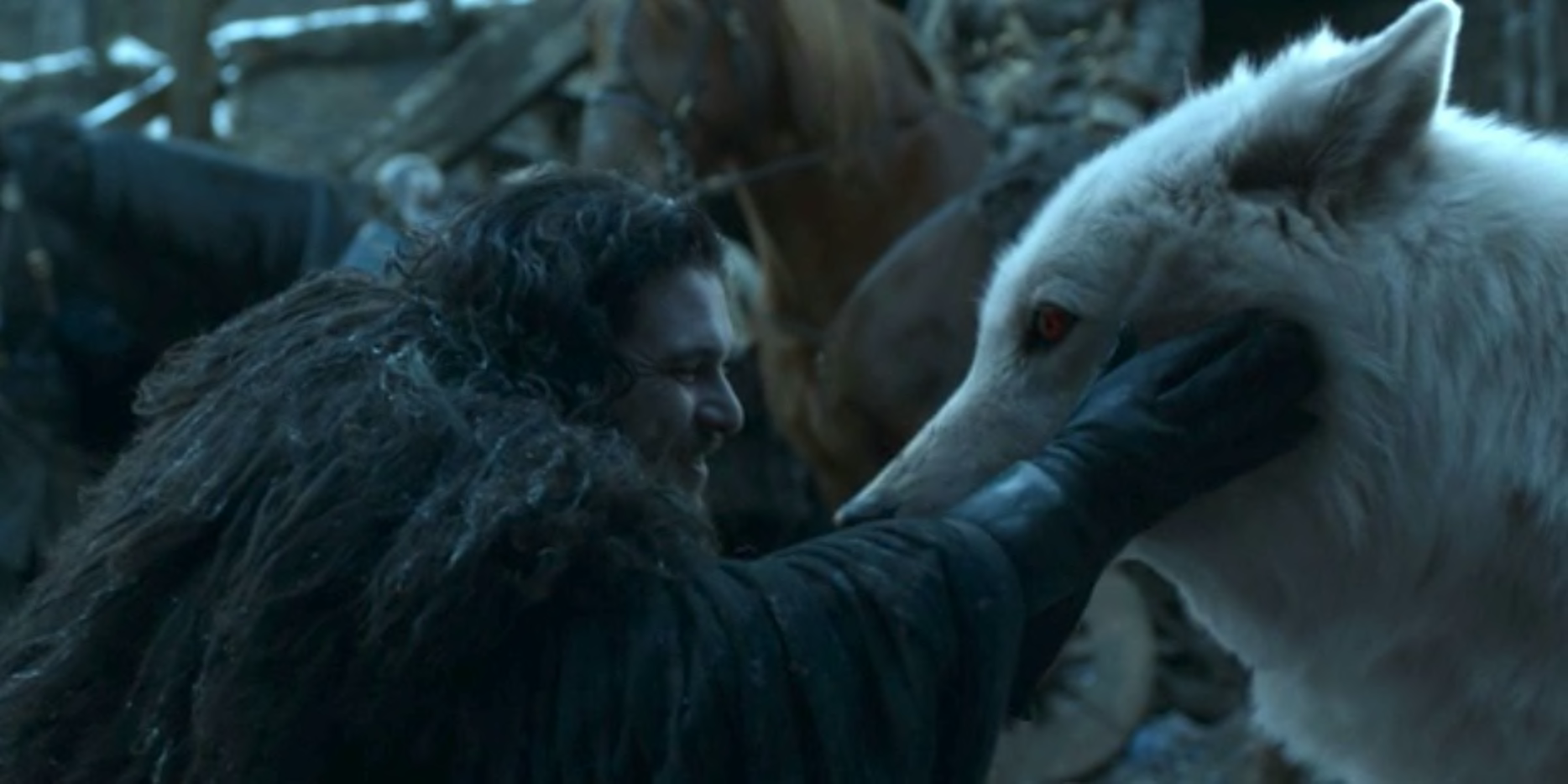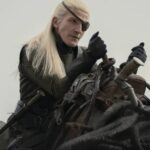It has now been eight years since the Game of Thrones season 5 finale, “Mother’s Mercy,” gave us the closing scene of Jon Snow being stabbed to death by his fellow brothers of the Night’s Watch. Game of Thrones was known for its lack of fear in killing main characters, but up until this point, Jon always seemed a character who was so intrinsic to the story that he was safe.
This was a significant moment in the show. Not only did it shock and devastate viewers, it marked the point where the show ran out of source material. Jon’s death scene is the final moment of A Dance with Dragons, the fifth A Song of Ice and Fire novel and to this date the most recently released. From this point on, the show was on its own, creating new storylines from outlines given to it by author George R.R. Martin. Book fans could no longer sit smugly knowing what was about to happen next.
Book fans did, however, know that this shocking scene with Jon was on its way; but since the show has already diverting from the books by this point, they didn’t know quite how it would happen. And indeed, the show and book versions of the scene are different. To mark eight years since this shocking moment hit our screens, let’s take a look back at this scene, and how the show and book versions differ from one another.
Jon and the wildlings
In both the books and the TV show, Jon is extremely conscious of the danger the White Walkers pose to those both north and south of the Wall. The more he learns about the White Walkers (also called the Others in the books), the more he comes to believe that his job as Lord Commander is to protect of humanity from the threat they represent, not just the people of the Seven Kingdoms. And that means protecting the wildlings, even if many other members of the Night’s Watch hate it; the Night’s Watch, after all, has been fighting the wildlings for centuries.
In both the books and the show, Jon has a positive rapport with the wildlings. He has lived amongst them and is particularly close to Tormund Giantsbane, who is deeply respected amongst the wildlings. In the show, Jon sees it as his duty to rescue the wildlings from the White Walkers by giving them land just south of the Wall; in return, they will fight alongside him when the White Walkers come for everyone. He even travels beyond the Wall to Hardhome to rescue many of the wildlings waiting there, allowing the survivors safe passage into the Seven Kingdoms by passing through Castle Black.
In the books, the situation is different. Jon still respects the wildlings, but he is more politically savvy about it. He has very loosely pledged allegiance to Stannis Baratheon, who in turn seeks to use the wildlings and northern houses to fight for his claim for the Iron Throne. Jon frankly doesn’t care about Stannis’ mission to take the Iron Throne, but he views Stannis as a potentially useful ally in the war against the White Walkers. If rescuing the wildlings and shoring up allegiances between them and the people south of the Wall will inspire Stannis to help fight the White Walkers, then Jon will do it. In return, Stannis tries to help the wildlings at Hardhome get south of the Wall.
Not content with just bringing the wildlings south, Jon also ensures the allegiances go deeper, arranging a marriage between a wildling Thenn (Thenns are more civilized and educated than other wildlings, although the show portrays them as vicious cannibals) and a runaway highborn girl, Alys Karstark. Far from this being a forced marriage, it is openly welcomed by both sides, and Jon uses it to further cement the wildlings as part of Westerosi society.
The Night’s Watch has prejudices against the wildlings, and there are certainly members unhappy about Jon strengthening ties between the groups. But in the books, they confine themselves to grumbling; it’s not what pushes them over the edge. In the show, the Night’s Watch history of fighting the wildlings makes a group of them unable to see the bigger picture, which results in them murdering Jon in cold blood. In the books, the tipping point is quite different…
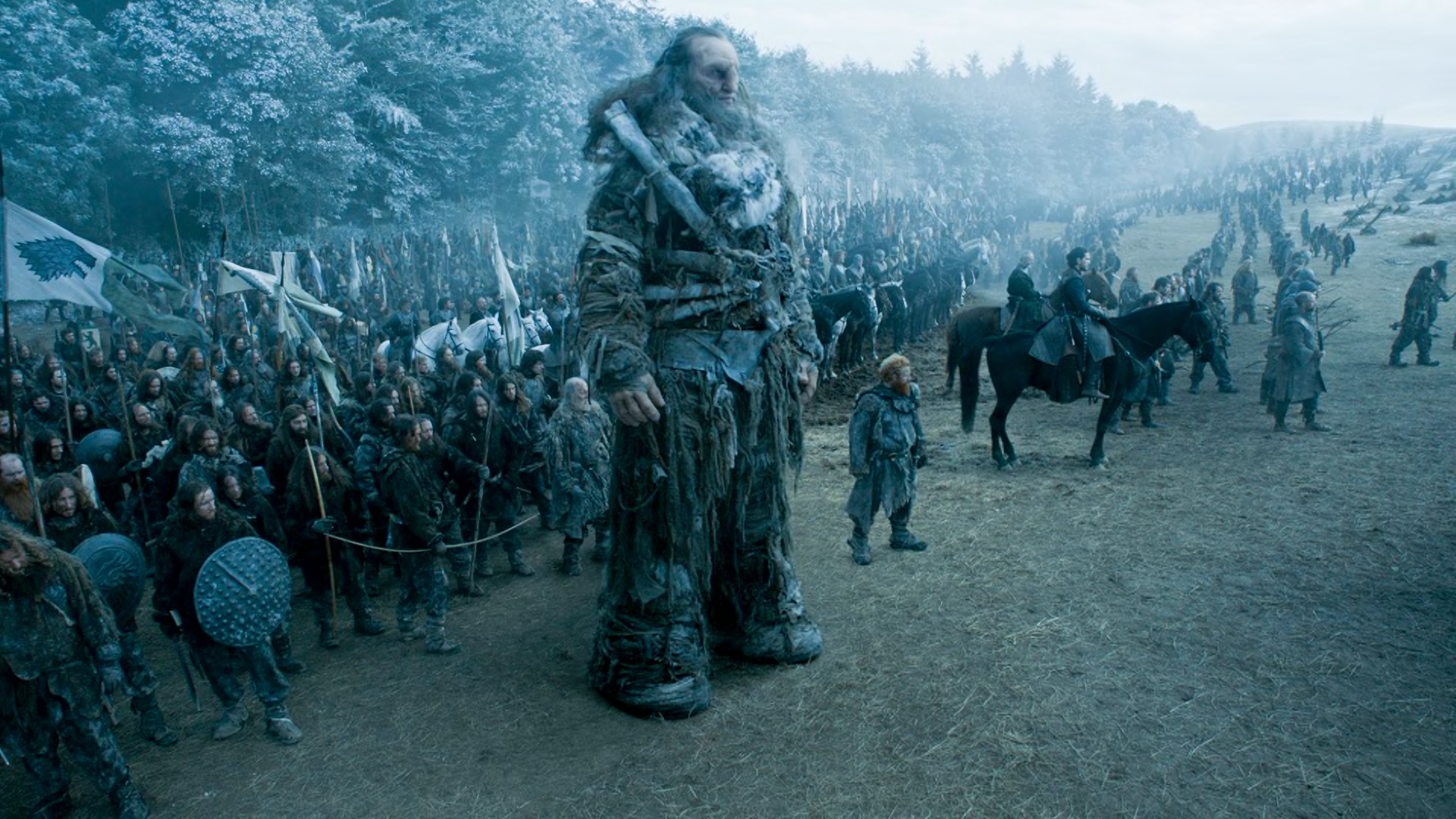
Image: Game of Thrones/HBO
Jon Snow and Arya Stark
Let’s leave the Wall for a second and look at what’s happening at Winterfell during this time. In the books, Jeyne Poole (the daughter of a former servant to the Starks when they ruled Winterfell) is forced into marrying the vicious Ramsay Bolton, the legitimized bastard son of Lord Roose Bolton. The Boltons pass Jeyne Poole off as Arya Stark, who everyone believes to be dead. Since Ramsay is marrying the trueborn daughter of Ned Stark, or so they tell people, the hope is that the Bolton claim to the North will be seen as more legitimate.
In the books, Jon and Arya’s relationship is very strong and a comfort for both characters aw they undergo difficult trials. Arya refers to her sword Needle (which Jon gifted to her) as being “Jon Snow’s smile.” When Jon feels lost and alone beyond the Wall, he thinks to himself how “He would give anything to be with her now.” The two of them were outsiders in Winterfell, even though Arya was highborn and Jon was the bastard son of Arya’s father. “Arya never seemed to fit, no more than he had.”
Being a member of the Night’s Watch means that Jon has had to put all allegiance to his blood family aside. He cannot choose them, no matter how much he may want to; he has to stay loyal to his brothers. We see Jon struggle with this when Ned is killed and Robb raises the banners for war; Jon goes as far as to attempt to ride away, but he ultimately returns, knowing that he must stay true to his new family now.
When Jon gets wind of Arya being married to Ramsay Bolton, however, with all the knowledge Jon has of the monster Ramsay is, he cannot simply put those familial allegiances aside. His love for Arya supersedes everything: his loyalty to his brothers, his hard work at forging an alliance between the wildlings and the northerners, his planning for winter, his preparations for facing the White Walkers. Melisandre, who is at the Wall at the time, attempts to tell him all will be well, saying, “The heart is all that matters. Do not despair, Lord Snow. Despair is a weapon of the enemy, whose name may not be spoken. Your sister is not lost to you.”
However, this is not enough for Jon, who thinks to himself, “What do you know of my heart, Priestess? What do you know of my sister?”
Jon cannot just sit there and hope Arya will be alright. He has to go to her himself.
And so he does. Jon, the Lord Commander of the Night’s Watch, breaks his pledge to the Night’s Watch to “live and die” at his post; he is prepared to die facing down Ramsay and bringing Arya to safety. Of course, readers know that it is not actually Arya at Winterfell, but Jon does not know this, nor does anybody else around him.
In the books, this is the tipping point for the Night’s Watch. They feel forced into this position, with several of the men openly weeping as they shove knives into his chest. They could forgive Stannis and Melisandre being at Castle Black, could forgive Jon’s political scheming, could forgive his alliance with the Wildlings, could forgive him upending the meaning of the Night’s Watch. But him betraying his vows and showing loyalty to blood family over his post was one thing too far. It is proof, as far as his brothers are concerned, that Jon’s personal agenda comes above everything else; and if that is so, then how can they trust him to lead them through the Long Night?
Of course, in the show, this nuance is entirely missing, because Jeyne Poole isn’t involved at all, to say nothing of her being passed off as Arya. Sansa Stark is married to Ramsey Bolton, and there’s no indication that Jon ever even finds out about it before his brothers attempt to kill him. The Night’s Watch loses faith in Jon due to his loyalty to the wildlings and nothing else.
Ghost
When Jon lies dying in the show, we get a close up of the life leave his eyes as blood pours from his body. In the books, however, we get to hear the final word Jon mutters as he fades away: “Ghost.”
Jon’s relationship with his direwolf Ghost is is crucial to his journey in the books, but is mostly dropped for the show. In the books, Jon is a warg; he has the ability to see the world through Ghost’s eyes, slipping into Ghost’s skin in his dreams.
And frankly, it annoys Jon a lot in the books that he keeps doing this. (If there was one word to describe Jon in A Dance with Dragons, it would be “annoyed.”) He’s aware of his connection to Ghost and grasps that it is important, saying to himself that “Ghost was a part of him,” but he is too preoccupied with too many other things to think too deeply about what it all means.
Now, this is just theorizing, as George R.R. Martin has yet to release The Winds of Winter, but one very popular fan theory has it that Ghost will save Jon’s life. Jon will — perhaps subconsciously — warg into Ghost, and so as his physical body dies, his mind and soul will be preserved in the body of his wolf. The theory goes that when Jon is resurrected, his mind and soul will shift from Ghost back into his human body; but after living as a wolf for an unspecified amount of time, Jon will emerge feral and angry after what has happened to him.
It’s true that George R R Martin rarely does anything idly, and that Jon’s final word being “Ghost” may prove important. Of course, with The Winds of Winter still not released, there is no saying whether this theory holds water. Things may well go the way they did in the show. We’ll have to wait and see.
Even though both versions of Jon’s death scene end with him dying in the snow, the circumstances make them feel very different. Jon’s death is a good example of how shifting things around just a little bit can create wildly different moods and meanings.
Game of Thrones is available to stream on Max. The A Song of Ice and Fire books are available to purchase now.
To stay up to date on everything fantasy, science fiction, and WiC, follow our all-encompassing Facebook page and sign up for our exclusive newsletter.
Get HBO, Starz, Showtime and MORE for FREE with a no-risk, 7-day free trial of Amazon Channels




















![[Book Review] The Blade Itself (The First Law Trilogy) by Joe Abercrombie](https://bendthekneegot.com/wp-content/uploads/2018/01/1516047103_maxresdefault-218x150.jpg)







